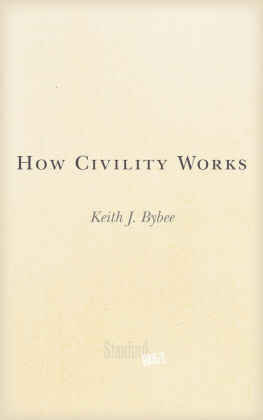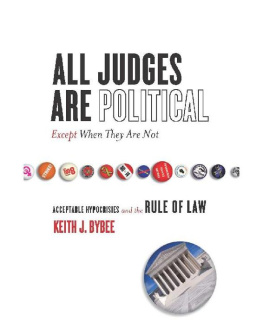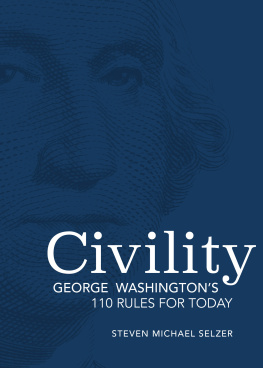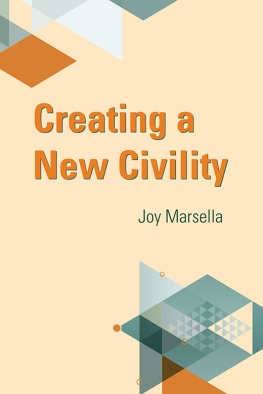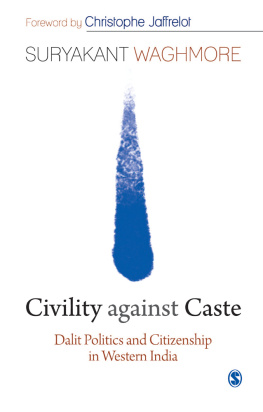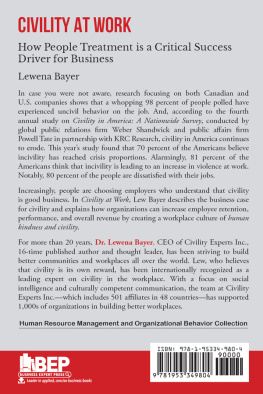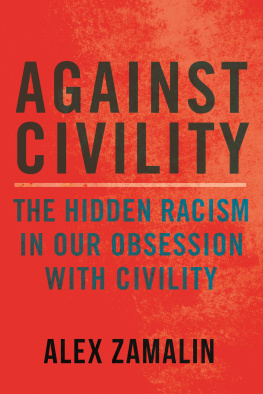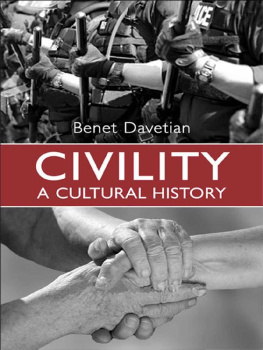Stanford University Press
Stanford, California
2016 by the Board of Trustees of the Leland Stanford Junior University.
All rights reserved.
No part of this brief may be reproduced or transmitted in any form or by any means, electronic or mechanical, including photocopying and recording, or in any information storage or retrieval system without the prior written permission of Stanford University Press.
Printed in the United States of America on acid-free, archival-quality paper
Library of Congress Cataloging-in-Publication Data
Names: Bybee, Keith J., 1965- author.
Title: How civility works / Keith J. Bybee.
Description: Stanford, California : Stanford Briefs, an imprint of Stanford University Press, 2016. | Includes bibliographical references.
Identifiers: LCCN 2016030148| ISBN 9781503601543 (pbk. : alk. paper) | ISBN 9781503601826 (electronic)
Subjects: LCSH: CourtesyPolitical aspectsUnited States. | Political cultureUnited States. | Freedom of expressionUnited States. | United StatesPolitics and government.
Classification: LCC JK1726 .B93 2016 | DDC 306.20973dc23
LC record available at https://lccn.loc.gov/2016030148
Typeset by Classic Typography in 11/15 Adobe Garamond
THE PROMISE OF CIVILITY
Can we all get along?
In 1992 Rodney King plaintively posed this question in front of television news cameras after the police officers who had beaten him were acquitted and the streets of Los Angeles erupted in riots. The rampage lasted five days and in the end left over sixty people dead and one thousand buildings destroyed. Kings plea did not stop the rioting, but he did achieve a kind of fame, and the call for peaceful coexistence would follow him for the rest of his life. When he died, Can We All Get Along was placed on his tombstone.
King spoke during a time of intense violence, but his question has a far broader resonance and can be asked of American society as a whole. We regularly experience episodes of turbulent protest. And beyond any particular instance of turmoil, we inhabit and sustain a contentious public culture. Our politics are preoccupied with the demonization of opponents. Our news media is saturated with aggressive bluster and vitriol. Our workplaces are rife with boorish behavior. Our digital platforms teem with expressions of disrespect and invective. Reflecting these conditions, surveys show that a significant majority of Americans believe we are living in an age of unusual anger and discord. A quarter of a century after King wondered whether we can get along, we find ourselves in a social world filled with conflict and hostility.
A host of authors and observers have diagnosed our malaise as a lack of civility and prescribed civilitys return as the cure. Americans once treated one another with far greater respect and consideration, the argument goes. If we can recover the traditionally courteous modes of relating to one another, we will find that our public life can be more restrained and peaceful. Political disagreements will remain, but new compromises will become possible as adversaries turn their attention away from maligning one anothers character and focus instead on scrutinizing competing policies. The news media will model civil engagement in its coverage, emphasizing fact-based analysis rather than sensationalizing conflict and relentlessly stoking animosities. Everyday exchanges between individualsincluding those on social media, in website comment sections, and at workwill become more sociable, with substantially less tolerance for harassment and insult.
IS CIVILITY POSSIBLE OR DESIRABLE?
Many say that civility is quite important. But the standard argument for it rests on shaky foundations. To begin with, it is not clear how we can rely on a settled store of past courtesies to save us when there is in fact no period in the past when civility was fully established and secure from challenge.
It is true that many people today feel that civility has vanished, and true that the cause can be traced to contemporary factors like political polarization and the rise of the internet. Yet it is also true, as historians of civility have noted, that generations of Americans have felt threatened by escalating incivility and they had no trouble finding causes in their own time. At different points during the twentieth century, Americans chalked up the deterioration of public conduct to jazz music, World War I, the Great Depression, World War II, the Vietnam War, the Civil Rights Movement, rock and roll, and the large-scale entry of women into the workforce. Nineteenth-century Americans blamed the Civil War, new immigrants, urban life, the vulgar rich, and the insolent poor. Talk of social crisis and fear of coarsening relations were also easy to find in the eighteenth century. James Madison along with many of our Founders complained about the truculence and crass materialism produced by the grasping, interest-ridden politics in the states. Given such a long history of rudeness, why should we believe that people are capable of getting along now?
In addition to this question of capacity there is also a question of motivation. The standard argument for civility begins with the assumption that our current ways of interacting are obviously dysfunctional and in need of repair. Yet instead of stipulating that we have failed, one could argue that our contentious public culture is a genuine accomplishment that we should wish to preserve.
For much of the modern era the courts have broadly interpreted the guarantees of the First Amendment. The result, as the Supreme Court noted in its landmark decision New York Times v. Sullivan, is that our public discussion has intentionally been kept uninhibited, robust, and wide-open. Caustic critique, furious rants, and outright lies go largely unchecked by the Constitution to ensure that the greatest possible diversity of claims floods into the public sphere. Some views may seem too abrasive and offensive to endure. But as Justice Holmes observed almost one hundred years ago, when men have realized that time has upset many fighting faiths, they may come to believe, even more than they believe the very foundations of their own conduct, that the ultimate good desired is better reached by free trade in ideasthat the best test of truth is the power of the thought to get itself accepted in the competition of the market, and that truth is the only ground upon which their wishes safely can be carried out. Nor does the value of untrammeled opinion stop with the discovery of truth and the exposure of injustice. Liberty of expression also allows for expansive breadth of thought and an extraordinary range for self-definition. Both of these things are very valuable. Indeed, according to Justice Brandeis, the development of conditions necessary to make men free to develop their faculties is nothing less than the final goal of government.
In short, our free speech society provides many advantages and in return asks only that we speak our minds and have thick skins. Why should we seek a more genteel means of managing our behavior?
The question of whether we are able to be civil, as well as the question of why we should want to be civil, can be answered by examining how civility works. The following pages are devoted to such an examination. As we shall see, there is substantial disagreement over what should count as civil behavior; strong criticism of civilitys repressive regimentation; and serious concern about civilitys authenticity. These disagreements and criticisms are themselves tied to underlying conditions, including the heterogeneity and dynamism of American society, a robust tradition of free expression, and our frequent inability to live up to our collective ideals.

